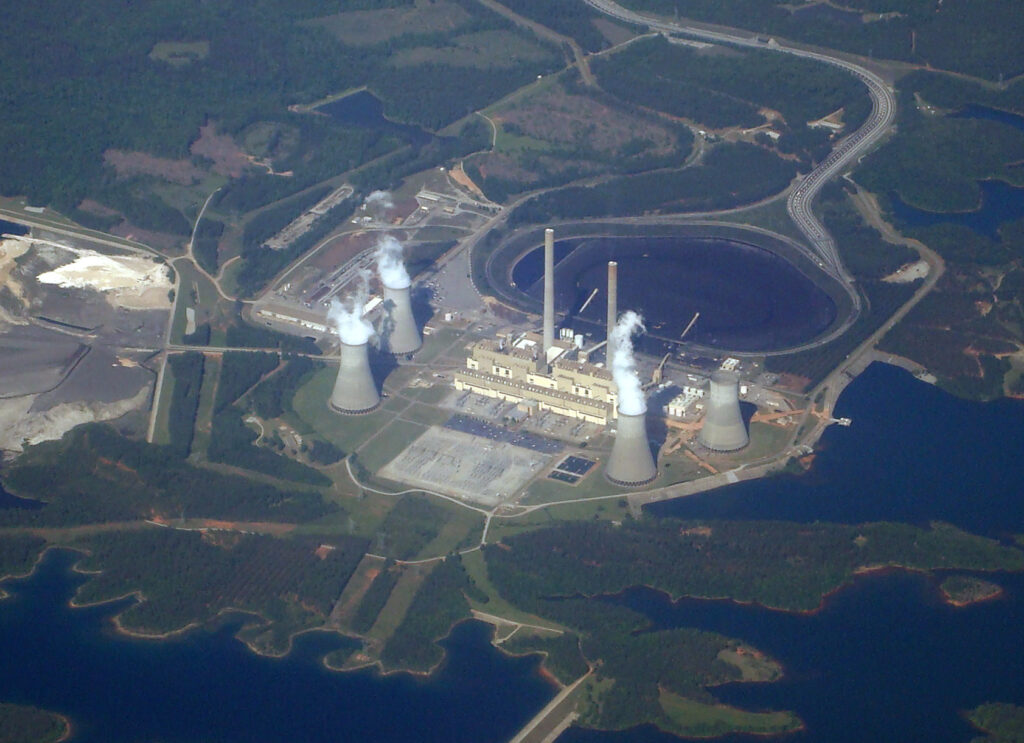
ATLANTA – The new test results that rolled in Wednesday night were about what Fletcher Sams expected: Out of 36 drinking wells in Juliette, all but six showed troubling levels of a cancer-causing substance that has riled residents of the small Middle Georgia town.
The next day, also as expected, was spent breaking the bad news to families living near the coal-fired Plant Scherer, where environmentalists say the toxic ash byproduct of burning coal suspected to be affecting their well water has long been improperly stored.
“It’s emotionally draining,” said Sams, executive director of the nonprofit Altamaha Riverkeeper. “People have been dealing with this issue for a long time.”
As more test results arrive, local environmentalists like Sams are watching legislation in both chambers of the General Assembly aimed at curbing the health and environmental dangers of coal ash.
The issue became an environmental priority for many Georgia lawmakers as state regulators received control over permitting and monitoring sites where coal ash is stored.
Lawmakers and environmentalists are especially worried about the potential effects of coal ash kept in liquid ponds at several Georgia Power Co. plants, many of which environmentalists say lack protective liners to prevent groundwater contamination.
Some bills before the state House and Senate call for installing liners on all Georgia Power ash ponds and requiring the company to give advance notice when the ponds being closed will be dewatered.
Other bills seek to make the collection fee for coal ash at Georgia landfills the same as for other kinds of garbage, which supporters say would discourage out-of-state power companies from sending their ash to Georgia.
A bill toughening rules requiring Georgia Power to give advance notice that it will dewater ash ponds cleared a House committee on Thursday – though environmentalists note dewatering has already begun at some power plants.
Another bill that would raise the fee for landfills to receive coal ash from $1 to $2.50 passed is scheduled for a Senate floor vote on Monday.
But the big piece of legislation environmentalists are eying would force Georgia Power to install impervious lining around every site where coal ash is stored to keep contaminated water from leaching into drinking wells and underground aquifers.
“This is the year to require liners,” said Jennette Gayer, director of the advocacy group Environment Georgia. “We’ve been behind the eight ball on coal ash for a long time.”
Identical measures on liners are being carried in the House by Minority Leader Bob Trammell, D-Luthersville, and in the Senate by Sen. Jen Jordan, D-Atlanta.
A review of Georgia Power permits by the state Environmental Protection Division shows coal ash in many of the ponds – including at Plant Scherer – may be dipping 25 feet or more into the surrounding groundwater table.
Coal ash could be sitting roughly 76 feet below the water table at Plant Wansley south of Carrollton, according to an EPD spreadsheet created last April.
In August, a review of Georgia Power permits by the nonprofit Southern Environmental Law Center found several ash ponds at power plants like Scherer and Wansley do not have sufficient lining.
Avner Vengosh, a Duke University environmental professor who has studied coal ash contamination in North Carolina, said contaminants could be constantly leaching into the groundwater if liquid coal ash sits several feet deep in the water table without any lining.
“It would be the worst-case scenario if it goes straight into the water,” Vengosh said.
Georgia Power is in the middle of closing its 29 storage ponds and depositing all its future coal ash in dry landfills. Most of the ponds will be excavated, but 10 are slated to be sealed in place “using proven engineering methods and closure technologies,” said Georgia Power spokesman John Kraft.
Excavating all 29 ponds could be expensive, given Georgia Power has already gained approval from the state Public Service Commission to raise customer rates partly to cover about $550 million in ash clean-up costs.
The company assures its close-in-place plans for the 10 ponds will be sturdy enough to safeguard against groundwater contamination. Its closure plans also call for semiannual groundwater monitoring around the sites.
“Regardless of the methods used, excavation or closure in place, we’re going to be sure that our closure plans are protective of the environment and the communities we serve,” Kraft said.
Kraft also said testing by third-party geologists of 57 monitoring wells around Plant Scherer have not found harmful levels of hexavalent chromium in Juliette.
“To reiterate, there is absolutely no evidence that our operations at Plant Scherer are causing impacts to our neighbors’ drinking water in Juliette, the Monroe County area or elsewhere in the state,” Kraft said. “Furthermore, if our operations were causing harm to residents, we would take every action necessary to resolve the situation.”
The assurances don’t sway Sams. He said tests so far on more than 80% of 72 drinking wells in Juliette have shown levels of harmful hexavalent chromium higher than a safety threshold used in California.
For a couple of wells, Sams said testing has found 10.4 parts per billion of hexavalent chromium, far higher than California’s 0.02-ppb non-mandatory public health goal. The maximum amount of hexavalent chromium that water can contain in California under state law there is 10 ppb.
The state EPD does not plan to test wells in Juliette since the responsibility for water-quality testing of private wells falls to local health departments, EPD spokesman Kevin Chambers said.
Sams said he and many Juliette residents have taken the lack of water testing by state regulators as motivation to push for the House and Senate bills requiring pond liners.
To make their point, Sams said Juliette residents plan to pack several tour buses on Monday and head up to the state Capitol to raise support among lawmakers.
“We will have conversations with every legislator we can find,” Sams said.
